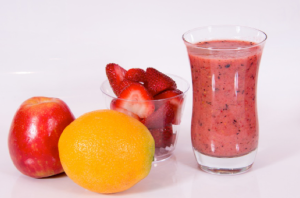Food Trend Chronicles: Juicing
 It seems like everywhere you turn lately, juicers, juicing diets, and juice cleanses are all the rage. But just because they're all the rage, does that mean that juicing is good for you?Juicing is the process of separating the juice of fruits and vegetables from their skins and fiber. When these are removed, more fruits and vegetables are needed to make enough juice to fill a glass. This process concentrates natural sugars and calories. Some juicing enthusiasts believe that concentrating juice will provide the body with more vitamins, minerals, and enzymes than can be consumed by eating whole fruits and vegetables. But, when adding juicing to the diet for the purpose of weight loss, you may be consuming more calories than you thought.Blending is the process of masticating produce (without rinds, peels, pits, etc) into a smoothie. This method keeps the fiber in the drink. Some proponents claim that, by pulverizing the fruits and vegetables, nutrients are more readily available for digestion. Unfortunately, there is no scientific proof of this.A word of caution when juicing/blending: Make only enough for what will be consumed within the hour. Nutrients are lost over time, but, more importantly, these juices are raw and a perfect environment for bacteria. Juice cleanses are being touted as a tool for quick weight loss and detoxification.Cleansing involves drinking only juiced or blended fruits and vegetables for a week or more. A diet of only juice is deficient in fiber, fat, and protein, along with many vitamins and minerals. This very low-calorie diet can put the body into starvation mode. Any diet that prohibits one or more food groups, or which requires a very low caloric intake, is one that can compromise optimal health and should be avoided.All of these forms of juicing have been promoted as ways to detoxify the body. Fortunately, the human body doesn't need to be cleansed because it has built-in detoxifiers. The kidneys and liver effectively remove toxins in the form of urine and feces. The skin and lungs are also detoxifiers. Drinking plenty of water throughout the day helps our super-detoxifying organs work at maximum capacity.Without scientific data to support the benefits of juicing, we should consume a diet composed of all food groups for optimal health, be mindful of our choices and portion sizes, and stay hydrated. Juicing has its place, but it should not function as the only form of sustenance, nor the only source of fruits and vegetables.By Beth Rosen, MS, RD
It seems like everywhere you turn lately, juicers, juicing diets, and juice cleanses are all the rage. But just because they're all the rage, does that mean that juicing is good for you?Juicing is the process of separating the juice of fruits and vegetables from their skins and fiber. When these are removed, more fruits and vegetables are needed to make enough juice to fill a glass. This process concentrates natural sugars and calories. Some juicing enthusiasts believe that concentrating juice will provide the body with more vitamins, minerals, and enzymes than can be consumed by eating whole fruits and vegetables. But, when adding juicing to the diet for the purpose of weight loss, you may be consuming more calories than you thought.Blending is the process of masticating produce (without rinds, peels, pits, etc) into a smoothie. This method keeps the fiber in the drink. Some proponents claim that, by pulverizing the fruits and vegetables, nutrients are more readily available for digestion. Unfortunately, there is no scientific proof of this.A word of caution when juicing/blending: Make only enough for what will be consumed within the hour. Nutrients are lost over time, but, more importantly, these juices are raw and a perfect environment for bacteria. Juice cleanses are being touted as a tool for quick weight loss and detoxification.Cleansing involves drinking only juiced or blended fruits and vegetables for a week or more. A diet of only juice is deficient in fiber, fat, and protein, along with many vitamins and minerals. This very low-calorie diet can put the body into starvation mode. Any diet that prohibits one or more food groups, or which requires a very low caloric intake, is one that can compromise optimal health and should be avoided.All of these forms of juicing have been promoted as ways to detoxify the body. Fortunately, the human body doesn't need to be cleansed because it has built-in detoxifiers. The kidneys and liver effectively remove toxins in the form of urine and feces. The skin and lungs are also detoxifiers. Drinking plenty of water throughout the day helps our super-detoxifying organs work at maximum capacity.Without scientific data to support the benefits of juicing, we should consume a diet composed of all food groups for optimal health, be mindful of our choices and portion sizes, and stay hydrated. Juicing has its place, but it should not function as the only form of sustenance, nor the only source of fruits and vegetables.By Beth Rosen, MS, RD


